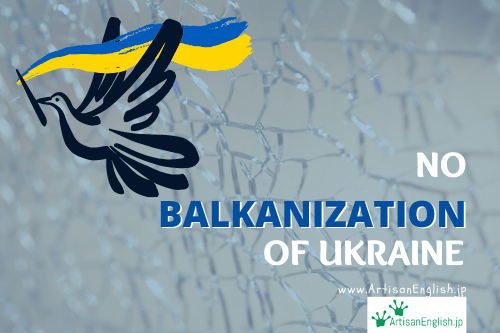
YouTube / iTunes / Spotify / Radio Public / Pocket Casts / Google Podcasts / Breaker / Overcast
Listen to ArtisanEnglish.jp posts & lesson intros here.
WotD: Balkanization
For the first time in our lifetimes, we are experiencing a major war in Europe that can erupt into a full-blown world war.
One word that you may hear used is Balkanization.
It’s a heavy word both in its historical significance and what it means for the people in Balkanized areas.
Balkanization means breaking up a region or state into smaller parts or states based on ethnicity, culture, religion or historical complaints.
We may be able to argue that when Russia annexed Crimea in 2014, it began the process of the Balkanization of Ukraine.
Recently Putin recognized the independence of two more regions in South-eastern Ukraine because they are more closely linked to Russia than Ukraine.
Balkanization is not a good thing because it often leads to war, bloodshed and suffering.
It comes from the constant division and reordering of the Balkan peninsula from about 1878 until 2008, especially during the period after the end of the First World War until 2008.
The Austro-Hungarian Empire did not survive WWI, and from then until very recently, countries had been formed, destroyed, and reformed based on religion, ethnicity, politics etc.
Now Russia has begun that process in Ukraine.
It’s not only there, though.
Russia invaded Georgia in a short war in August 2008.
The result was that Russia recognized the independence of the two areas named Abkhazia and South Ossetia.
If this sounds familiar to what is happening in Ukraine right now, that is because it is.
Russia is trying to take a page out of its book, but things are not going according to plan.
Flesch-Kincaid Readability Test
This post is understandable by someone with at least an 8th-grade education (age 13 – 14).
On the Flesch-Kincaid reading-ease test, this post scores 60.
The easier a passage is to read, the higher the score on a scale of 0 – 100.

